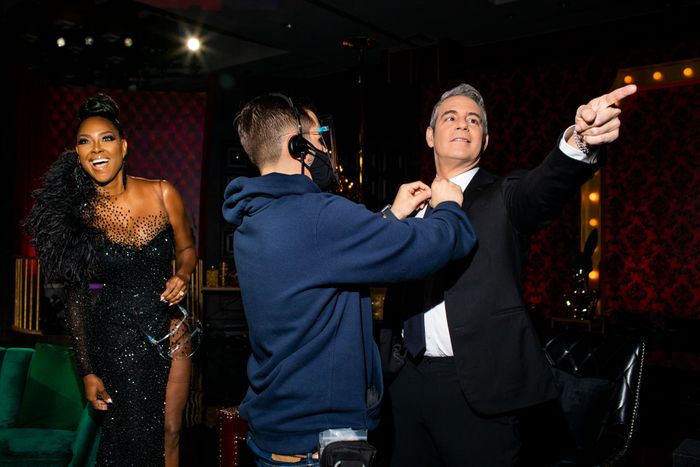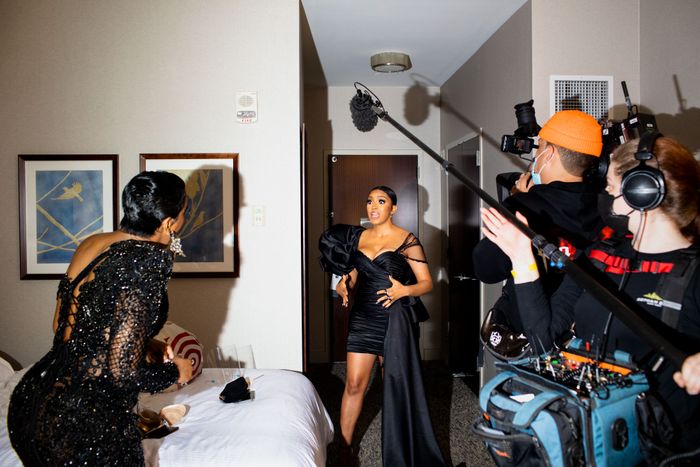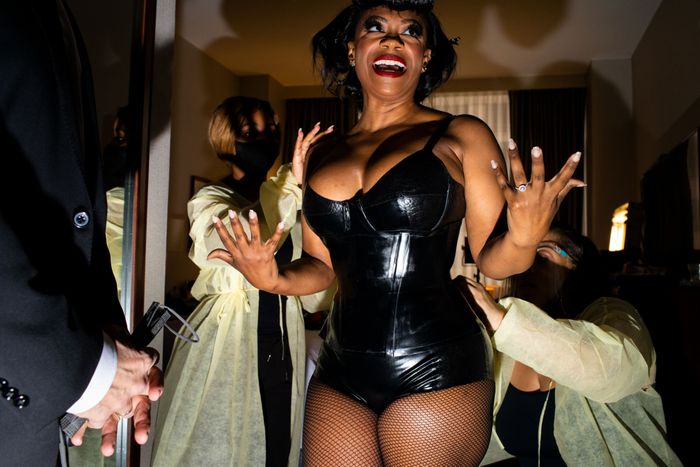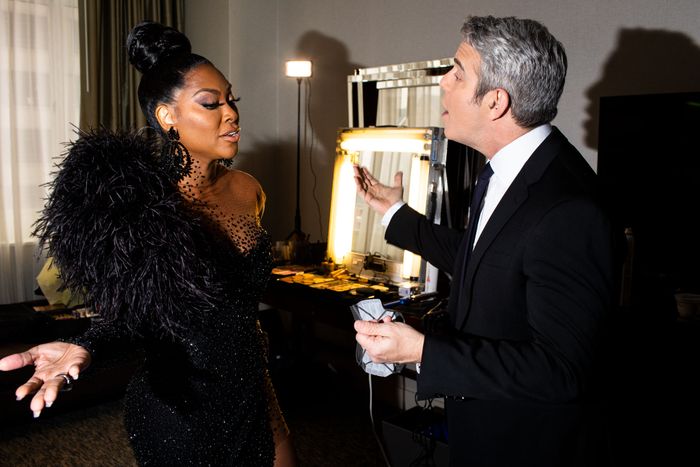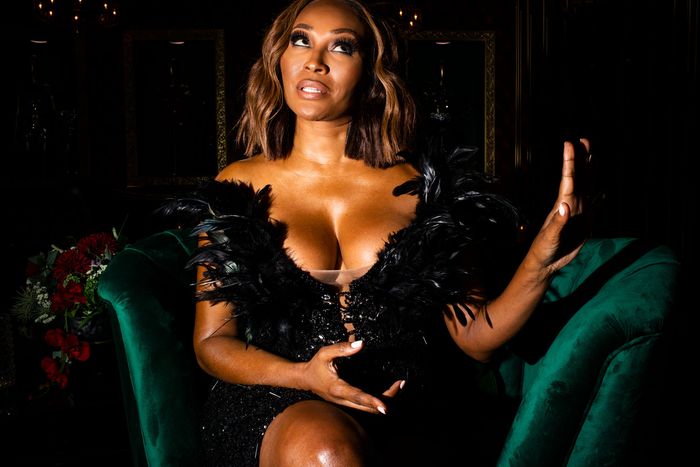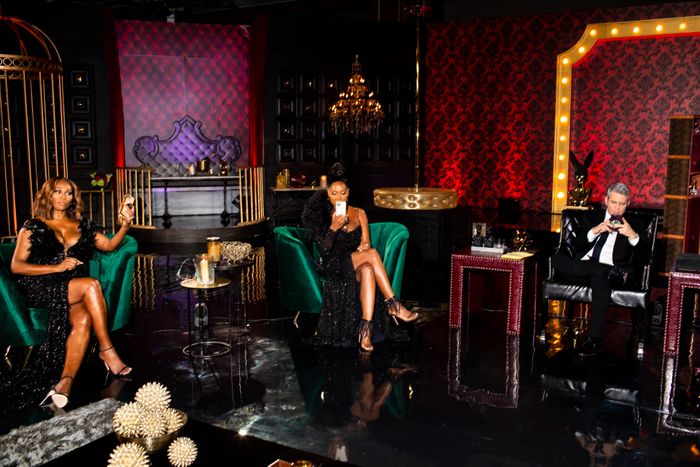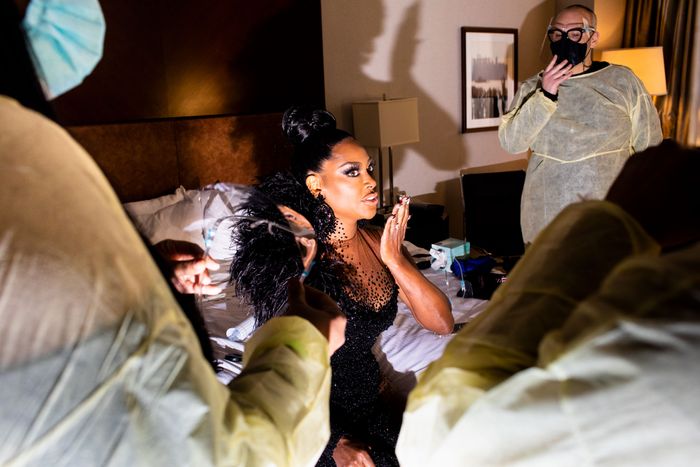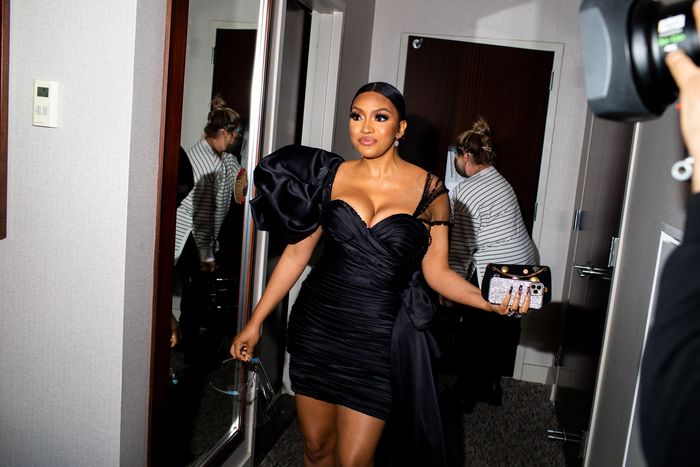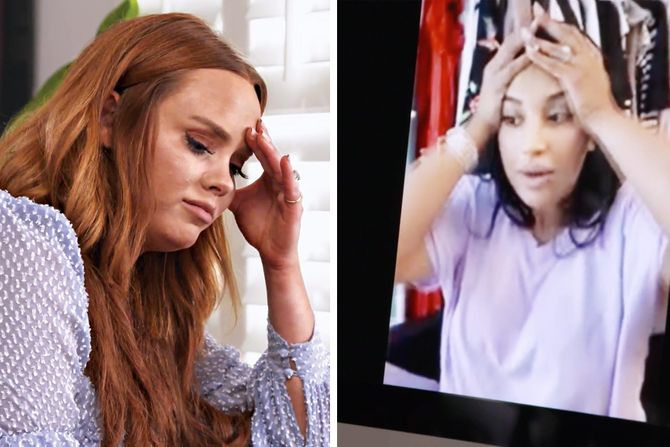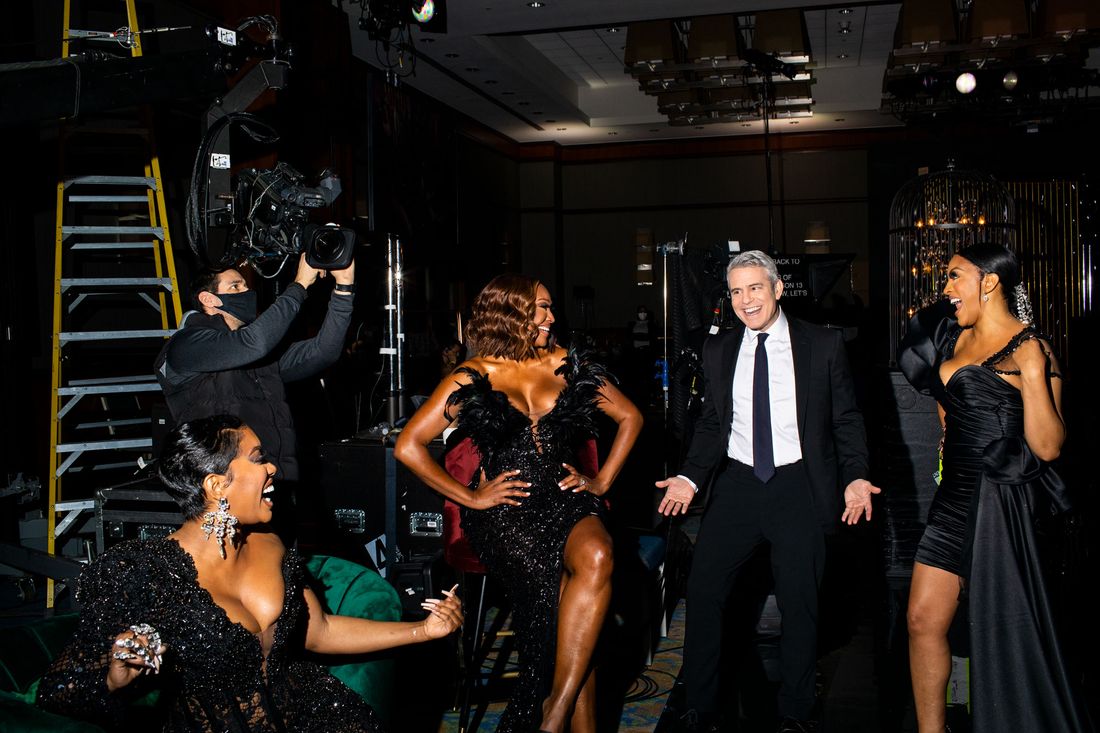
This article was featured in One Great Story, New York’s reading recommendation newsletter. Sign up here to get it nightly.
In 2020, Leva Bonaparte considered a job opportunity. Bravo had been pursuing the hospitality executive for years in an attempt to get her to join the cast of Southern Charm. The series, which premiered in 2014, featured a group of genteel degenerates living in Charleston, South Carolina. For many seasons, the central tension was the romance between 52-year-old Thomas Ravenel, the former treasurer of South Carolina, who’d resigned after being indicted on drug charges, and his 21-year-old girlfriend and the mother of his two children, Kathryn Calhoun Dennis. (That’s Calhoun as in John C. Calhoun, the proslavery vice-president of the United States of America.) Dennis and Ravenel were drawn to each other in a way that felt authentic but dangerous; as in the film Mr. and Mrs. Smith, it seemed equally plausible that the couple would wind up with a happy ending or dead by each other’s hands. Along with the show’s other stars, Dennis and Ravenel would play polo and drink rosé out of pint glasses while dressed in brick-colored shorts embroidered with critters. The activities often took place at cast members’ ancestral plantations, but sometimes — and this is how Bonaparte, who is not a degenerate, comes in — at Bonaparte’s restaurants.
While other Charleston establishments had refused to be part of what they called Charmageddon, Bonaparte says, “I just knew it was going to be great for the city in the long run.” She was friends with the cast (Craig Conover owned a minority stake in one of her restaurants; Danni Baird had thrown her a baby shower) and thought it would bring attention to her businesses. Bonaparte says 2020 looked as if it would be a year when her business and personal lives would be “coasting.” Why not join the show? It could be fun.
But when Bonaparte’s debut season began filming in February of last year, she found herself in the role of educator, rather than reality star. In her scenes, especially those shot in the months following the police killing of George Floyd, she is called upon to explain racism to her white castmates. Bonaparte, who is Persian and whose husband and son are Black, tries to get Dennis to understand the implications of a statue of John C. Calhoun being taken down and explains why it was wrong of Dennis, in a fight taking place over Instagram DM, to send a monkey emoji to a Black activist.
“It was tough,” Bonaparte tells me of those efforts. “I started to feel a little bit gaslit. Like, ‘Oh, this is the new person bullying Kathryn.’ A sentiment I got from so many people was ‘You came onto the show and ruined it for me!’” Did the viewers mean that a light show was an inappropriate venue for serious issues, even though Southern Charm had previously covered Dennis’s and Conover’s substance-abuse issues and the tortured custody battle between Dennis and Ravenel? Or was it that Bonaparte had spoiled the fun by making it impossible to ignore the realities of racism, past and present? “I found it draining,” Bonaparte says. “I just wanted them to be conscious and say, ‘You know, that is part of my history and a part of American history. And I want to do everything possible to make amends.’ ”
Before last year, Bravo didn’t seem particularly concerned with hiring people who could hold nuanced conversations about inequality. The network’s reality shows featured outrageous people behaving terribly, but they did so with what the network’s front man, Andy Cohen, calls “the Bravo wink”: not an explicit rebuke, but editing that lets viewers know the producers understand that what’s happening is ridiculous. This could be anything from a hypocrisy-highlighting montage to a lingering shot of one cast member calmly sipping wine while her co-star drunkenly rolls around on the lawn, or throws a flute across it. Viewers were comfortable being passive observers, wine glasses safe and unbroken in our hands as we enjoyed the mess onscreen.
But recently, many fans have started questioning who deserves access to the Bravo platform. It’s no longer enough for Bravo to wink at its viewers. To succeed, the network and its stars must figure out how to make good TV in the sense that it is watchable, but also good in the sense that it is ethical — or at least not quite so obviously bad. So what does television’s pettiest, bitchiest, most dramatic network look like when it grows a conscience?
The truth is there is no rule book,” Cohen tells me through a video screen, clad in tie-dye in his West Village co-op. Like the rest of the late-night hosts, Cohen temporarily had to shoot his talk show, Watch What Happens Live, remotely, and he is striking matches as he shifts around his at-home studio, at first to light a candle and then seemingly just to have something to do with his hands. “Everything is a case-by-case situation. The goalpost is always moving.”
Despite knowing the cast members for years — his baby shower was hosted by five Real Housewives, including two who would subsequently leave the network — Cohen seems able to compartmentalize the stars’ dual roles as fallible humans and TV characters integral to their shows, many of which he executive-produces. He is an executive turned onscreen talent and delivers to Bravo something between the world-building micromanagement of J.K. Rowling and the perceived omnipotence of Oz the Great and Powerful. Cohen says that in relation to cast members, his role encompasses “friend, foe, boss, ally, father, boyfriend.”
“Ultimately,” he says, “the thing I am the most is a cheerleader. Because the truth of the matter is I want each of them to succeed. If each of them succeeds, it is success for me. Trust me. When they don’t, it’s more trouble for me because we have to find new ones.”
The Real Housewives debuted 15 years ago as a voyeuristic trip past the guard booth of the gated Orange County community Coto de Caza. If you rewatch the early seasons, which were overseen by now executive vice-president of current programming Shari Levine, they feel like a Lauren Greenfield movie documenting the lives of the blithely prerecession rich. After the market crashed, the shows became louder, funnier, and campier to make up for the affluence they were no longer necessarily showcasing. Bravo, which before the mid-2000s was best known for Inside the Actors Studio and niche film rebroadcasts, turned itself over to the Housewives, expanding west to east with The Real Housewives of New York and south to The Real Housewives of Atlanta. Casting requirements remained the same: having enough money to appear rich (a common insult is to accuse someone of renting her mansion) and enough personality to incite conflict with the other women. And the rules of engagement developed quickly. You can go after someone’s parenting but not their children. You can question someone’s motives but not their booze consumption, unless you’re willing to have your own drinking scrutinized. You can throw a glass or a table but only if someone has disrespected you by, for example, implying without evidence that your husband is cheating on you.
If you ask Levine, good values have always been central to the Bravo universe. “I think a lot of our shows become morality tales in the end,” she says. Playwright and MacArthur “genius” grant recipient Branden Jacobs-Jenkins has suggested that the character arcs more closely resemble early Greek tragedies, which used audience participation to exact justice. In them, bad behavior was often rewarded if it was also entertaining, as when Lisa Vanderpump connives to display tabloid stories detailing castmate Kyle Richards’s alleged marital problems.
The Greeks also foretold the humbling of characters like the imperious Karen Huger, the grande dame turned rental-mansion hopper of The Real Housewives of the Potomac, and Luann de Lesseps, the countess turned felonious alcoholic of RHONY. Both are viewer favorites. Even major sins, from cruelty to bigotry to felony, are usually acceptable if you’re popular with viewers, play by the network’s rules, and are willing to have your problems televised. If a cast member disparages Bravo or leaks a spoiler from the show in an interview or on social media, that person can lose some of their end-of-season bonus, according to someone close to the productions. Criminal legal indictments and prosecutions are not disqualifying as long as you and your legal counsel are comfortable with your discussing them on-air. The Real Housewives of New Jersey star Teresa Giudice served an untelevised prison sentence for multiple counts of fraud before returning to the series. “There were people who said, ‘You have to fire her,’ ” Cohen tells me. “And it’s like, ‘Look, she’s going to jail. We’ve invested all this time.’ This was something that her friends were accusing her of for years, and she was running from it. I’d rather see her grow as a human being than kill her off.” Five seasons later, the aftermath still drives the plot.
That model may be replicated in the network’s newest franchise, The Real Housewives of Salt Lake City. “I’ve been blessed to do very, very well,” its star, Jen Shah, told me in her last interview before she was arrested for participating in an alleged national telemarketing scam targeting elderly people. She explained her business, now the focus of a federal indictment, this way: “I go over pro formas, numbers, pivot tables … and see how those are lining up with the actuals. I guess the most exciting part of that aspect of my business would be the creative that goes into the ad itself. But other than that, it’s — it’s a lot of numbers and metrics and key performance indicators that people are just like, ‘Oh, wait, what are you talking about?’ ” Shah has pleaded not guilty; according to a source close to production, her arrest will likely feature heavily in the show’s new season, filming now.
Bravo conducts real-time, mid-season “series maintenance studies” on long-running shows and an end-of-season postmortem on each franchise, collecting viewer reactions to plotlines, individuals, and all possible onscreen pairings. Dave Kaplan, who heads Bravo’s audience-research team, confirms that “if a certain set of traits are just becoming too consistent or too pervasive, there are ways that we can make sure we provide a little bit more balance with that individual.” In other words, after de Lesseps asked to be called “Mrs. de Lesseps” instead of “Luann” by a driver, Bravo endeared her to audiences by airing footage of her drunkenly falling into a bush.
The network also reviews data on the Bravo viewer, who in the median is a woman in her 40s if she’s watching on broadcast TV, in her 30s if she streams, and 30 percent wealthier and more likely to have a college degree than the average cable viewer. Although Bravo’s overall makeup is evenly spread along the ideological spectrum, the Dallas and New Jersey franchises of The Real Housewives have the most conservative audiences, the Potomac and Atlanta ones have the least conservative, and RHONY has the most self-identified liberals.
Judgment Day comes at the end of the season, when Cohen gathers and interrogates the castmates about their behavior that year in a reunion special. “These reunions are user generated,” he says. “We wanted them to be the place where it was a reckoning for the cast of their behavior for the audience.”
Cast members across franchises employ various survival strategies for the day of reckoning. RHOA’s Cynthia Bailey says she tries to work through as many issues with fellow cast members as she can during the season in an effort to deliver the conflict necessary to drive the plot but to avoid the reunion hot seats, which are directly to Cohen’s right and left. Bailey says, “I joke with Andy all the time, like, ‘As long as I’m not sitting next to you, I know I’m giving what I need to be giving and I was on the right side of resolving it before we got here to the reunion.” Bailey is usually in the middle of the couch, the ideal position for someone who does enough but not too much. If you’re shunted to the end, you may soon find yourself without any seat on the sofa.
The reunion couch is also the place of final appeal for Housewives who need to make a case for their continued employment. LeeAnne Locken of The Real Housewives of Dallas was a fan favorite for several seasons. The self-described former “carny” (as in, she grew up traveling with carnivals) once hissed, in the moments before undergoing a breast augmentation, that another cast member’s husband “gets his dick sucked at [Dallas gay bar] the Round-Up,” clarifying, “I know the boys who did it.” This moment, while homophobic, was so absurd that it instantly became a meme. But Locken learned the wrong lesson from the attention she received, subsequently going after Hispanic co-star Kary Brittingham’s heritage by calling her, among other pejorative terms, “a chirpy Mexican.”
It’s likely Locken was out before the footage ran. Levine says, “There came a point where LeeAnne’s ability to be with that group of women went away. There was no connection, and on an ensemble show, you need to have a connection.” But crucially, according to Cohen, “She had a lot of time to prepare for that reunion and to prepare for the season airing. To think about what she had said and to learn from it. What we producers found, and then the audience found, was that maybe she hadn’t taken that opportunity to do that. That was really a big reason in her [firing].” Rather than guiding Locken to the path of televised salvation, Bravo deferred to the reactions of viewers and cast members. Her unapologetic appearance at the reunion was, in Bravo’s view, Locken letting herself go.
By the summer of 2020, that free-market approach to the cast members’ ethical shortcomings wasn’t working anymore. “We want the audience to be engaged, but we don’t want them to be outraged,” says Alex Baskin, president of Evolution Media, the production company responsible for Vanderpump Rules, The Real Housewives of Beverly Hills, and RHOOC. “The audience has been really clear that they do expect us to take some accountability for the people that we have on the air and that it isn’t acceptable for us just to say, ‘We’re just the observers.’ ”
The first series to experience the shifting ground of moral culpability was Vanderpump Rules, one of the most successful shows on Bravo’s lineup. For the first seven seasons of its run, millions of viewers watched as the series chronicled the exploits of a group of longtime friends who work in former RHOBH cast member Lisa Vanderpump’s West Hollywood restaurants. There were plastic surgeries and infidelities and booze-and-Xanax-powered fistfights. Its stars occasionally received criticism, as when Jax Taylor and Brittany Cartwright enlisted, and then were forced to fire, Cartwright’s family’s anti-gay pastor as the officiant of their Versailles, Kentucky, wedding. But the backlash begot more backlash. As Cohen points out, “They’re not the Obamas, okay? They’re not holding public office. They’re bartenders and waiters at Sur.”
But by the premiere of the eighth season, in January 2020, Vanderpump Rules had become a liability. Cast members Brett Caprioni and Max Boyens had their screen time edited down and ultimately were castigated by Vanderpump during the show’s reunion for, among other transgressions, old tweets that liberally used the N-word. The reunion aired in June, as the Black Lives Matter movement captivated the nation and as the former — and the previous season’s lone — Black recurring cast member, Faith Stowers, did an Instagram Live in which she described encounters from her time on the show that went beyond the usual hazing of newcomers. Stowers pointed to a 2018 incident in which co-stars Stassi Schroeder and Kristen Doute bragged about reporting Stowers to the LAPD after seeing a news report that a Black woman was stealing from men in Los Angeles. “It was a Black woman with a weave,” Stowers said of the actual thief, “and they called the cops on me. It didn’t work, so they were upset about that.”
To decide Schroeder and Doute’s fate, Baskin met with Levine, senior executives from the production, programming, and legal teams, and NBCUniversal’s chairman of entertainment networks, Frances Berwick. The women had issued apologies, but with production suspended for COVID, there was no opportunity to document the consequences (including any redemption arc) on screen. “We all wanted to be respectful to the moment but not prisoners of the moment,” Baskin says. “That’s sort of the thing about being one of the really white-hot stories at the time; other shows were going to make their decisions based on how ours netted out.” Bravo executives knew that the way they handled Schroeder and Doute, coupled with the firing of Locken, would send a message to other Bravo talent.
Days later, Doute’s, Schroeder’s, Caprioni’s, and Boyens’s contracts were terminated. A few months after that, Cartwright’s and Taylor’s were as well. Baskin still has doubts that they did the right thing. “Is there another way of handling it?” he says. “Potentially turning it into a teaching moment? It’s really hard because they’re not bad people.” When presented with the idea that some of the best reality stars actually are bad, Baskin concedes. “That’s a very fair point,” he says. “In some cases, that’s right.”
The Vanderpump Rules layoffs polarized its audience: some fans called it “cancel culture,” while others looked to the network to clean house and terminate other problematic cast members on its programming. A high-priority target was RHOC’s Kelly Dodd, who spent much of 2020 denouncing COVID shutdowns, comparing masks preventing the spread of the virus to underwear preventing the smell of farts, and attending Trump boat rallies with her now-husband, Fox News reporter Rick Leventhal.
“It’s troublesome to me,” Cohen tells me with the look of perturbation you might have seen him use while questioning RHOP husband Michael Darby about pinching a cameraman’s bottom during filming. “I disagree with her point of view about COVID, but there are a lot of people who share her opinion. And by the way, she is in Orange County, where her opinion is probably the prevailing opinion.
“The line between celebrating someone’s outspokenness and not liking someone’s outspokenness is really blurring these days,” he continues. “Bravo is meant to be escapism, and I don’t personally think that the people on Bravo should be on trial for their political and cultural views. That doesn’t seem that fun to me!”
The wave of un-fun firings never came. Instead, Bravo went on a hiring spree, integrating previously all-white casts. Increasing cast diversity had long been a back-burner concern at the network; Cohen says Bravo had asked Black women to join the cast of RHONY in the past, but it never worked out. One woman was, Cohen says, “the best possible person,” but her husband and children refused to appear on-camera, a disqualifying position. The earnest effort to desegregate had started only in 2019, when actress Garcelle Beauvais joined RHOBH. It would immediately become clear how hard it is to have productive conversations about identity — and ones that are fun enough to belong on an entertainment network — with people who are clueless.
Dr. Tiffany Moon, RHOD’s first Asian American cast member, started filming the show after a social-media post surfaced of her white co-star Brandi Redmond mocking Asians. “Everybody ask me what Asian I am because my eyes, they squinty,” Redmond says in the video. The first time Redmond and Moon meet, Redmond apologizes for the video, and Moon explains what it’s like to experience anti-Asian discrimination. Moon was ready to move on. “She’s not the brightest and thought it would be funny,” Moon tells me of Redmond’s video. “I wasn’t going to crucify her for it.”
But, Moon says, she quickly came to feel that managing her white cast member’s feelings about her race dominated her role this season. “I’ve been a little hesitant around Tiffany in general,” Redmond says during a cast trip to Austin in episode eight, evidently worried that she will inadvertently do something racist again. “Is it okay to be that silly, fun Brandi, or is it not okay? Is it going to get me into trouble? What is acceptable for me, and what’s not?”
Moon was confused; Redmond’s date on the Austin trip was a sex doll, complete with a large blow-up penis. “What part of you is not being yourself right now?” Moon remembers thinking at the time. “When she sees my Asian face — which I have no control over — all it does is remind her of her shame and guilt. And I bear the brunt of that.” Meanwhile, their castmate Kameron Westcott went on Watch What Happens Live and compared Moon, who was born in China, to the “bossy” Thai sex workers the Dallas Housewives had observed during a cast trip. Cohen, mouth agape, paused and then changed the subject.
Not only do first-time cast members have to overcome the inherent audience skepticism of any rookie, they now have the additional burden of doling out teachable moments when an established cast member makes a racist comment. The standard introductory period in most series entails senior stars testing freshmen. More inclusive casting means a coven of white women will be confronting what is often a lone woman of color.
Eboni K. Williams, a cable-news journalist and self-described “full-on Bravoholic,” will make her debut this season as the first Black cast member of RHONY. “At first, the women were definitely walking on eggshells a bit,” New York Housewife Leah McSweeney says of Williams’s entrance. “Even New York City, where there’s so many different ethnicities, we are a segregated city. You saw Ramona [Singer]’s birthday; there was not even a brunette person there. That doesn’t mean that Ramona doesn’t like Black people. There’s just no Black people in her circle of friends. When you see this season, it is the microcosm of what’s happening in our country. We were forced to have these conversations.”
Williams didn’t need to be forced. “I would say that my time at Fox News was a great primer for my experience on the show,” she says. “It’s a fool’s errand to go into these conversations thinking you’re going to change the other person. All you should really concern yourself with is delivering clear, authentic, fact-based, emotionally authentic communication. It’s really never me saying, ‘Oh, let me have this conversation with Ramona so I can get her to understand Black Lives Matter.’ That is not my fucking job. Bravo didn’t pay me for that. Nor is it even my assignment to get all of the people that watch this show to understand that. Like, I’m really not a teacher on this show.” Still, she says, “If people get an education, that’s amazing.”
What it means to be a successful Housewife is changing for the white cast members as well. McSweeney puts it this way: “How do you be the shady bitches that you’re supposed to be without looking like racist shady bitches?”
RHOA has always been centered on Black women’s stories, which made for a uniquely successful reality-TV depiction of the Black Lives Matter movement. “We didn’t say it was a mandate in Atlanta that we somehow include Black Lives Matter in the show,” Cohen says. “This is what the women were doing. So we will always follow the story of what the women are doing.”
RHOA has been one of the network’s highest-rated series since it debuted in 2008. The cast is now entirely Black, which has allowed the women to discuss social issues with at least some common understanding. It helps that the RHOA cast includes some of the funniest women on television; their casual roasts over lunch would be a tentpole fight on other franchises.
Porsha Williams, who joined the show in 2012, is the granddaughter of civil-rights leader Hosea Williams, and found her voice as an activist following the killing of Breonna Taylor. She tested poorly in her early seasons, committing sins ranging from refusing to join the other women at a strip club to confusing the Underground Railroad with a literal train. Kaplan says she is now, according to the data, “one of the most beloved Housewives across all of the cities,” which earned her a second gig co-hosting Bravo’s Chat Room, the “late-late” chat show that follows Watch What Happens Live on Sundays. All season long, Williams has showcased her activism, including multiple arrests, without missing a single opportunity to shade a castmate. All of it felt equally authentic.
Popular long-running cast members enjoy the influence their status entails, extending to the corporate level. In the summer of 2020, Bravo planned to stream conversations about race and racism on the network’s website and on Instagram. When Kandi Burruss, an original star of RHOA, heard about the idea, she wrote an email to Levine saying there were some changes she would like to see at the network — starting with the idea that any special about racism should air on TV, in prime time, and feature popular cast members involved with the movement. “We always say ‘Bravolebrities,’ Burruss says. “Those are our friends in our heads. So what I was saying to Shari is if people have the opportunity to hear their friends in their heads say, ‘Yeah, we even deal with these situations,’ then it’ll help them look at it differently.”
The result was the televised special Race in America: A Movement Not a Moment. An election episode, Race in America: Our Vote Counts, followed. “It happened quick,” Burruss says of Levine’s response. “It wasn’t like she twiddled her fingers and just blew smoke up my ass.” Levine brought in Dorothy Toran and executive producer Leslie D. Farrell, who had produced Southern Charm before leaving the network to create Peabody- and Emmy-winning documentaries on race and poverty. Farrell could manage the tonal counterweight between the gravity of the topic and the levity expected from the network. “It’s still Bravo,” Farrell says.
Burruss’s letter to Levine had other action items. There were many Black crew members on Bravo shows, but Bravo didn’t work with any Black-owned production companies until Levine hired the company that produced Race in America. (Levine says there now are multiple series in development from production companies with BIPOC owners.) Burruss asked that Bravo internship spots be set aside for students from historically Black colleges and universities; Levine tells me that NBC has expanded the size of its outreach program to increase diversity. “Not any of the people that I’ve had any experience with at Bravo are racist or come off as racist to me,” Burruss says. “But if you don’t have enough African Americans around you that are also in your ears saying, ‘Oh, this will be a great idea,’ you’re just not informed.” So Burruss asked Levine to recruit and hire more Black executives; NBCUniversal had recently unveiled a restructuring that it says elevated Black talent within the company.
Burruss shared the contents of the letter with her castmates, including Williams, Tanya Sam, and Marlo Hampton. She also discussed it with former co-star NeNe Leakes, who in the fall of 2020 accused Cohen and the network of racism before announcing she would be leaving the show. Burruss expected the other women to be pleased, but in a separate exchange over text messages, they expressed annoyance that Burruss had gone to Levine without telling them. Burruss didn’t understand why a private, professional correspondence needed to be run past her castmates, and was particularly bothered that Williams was not supportive. “They say they were upset because I did not include them,” she tells me. “But we all have our way that we’re helping with the movement.”
The fight was leaked to the blogs. Suddenly, a nuanced disagreement about activism was being processed through reality-show story lines. Burruss decided to confront Williams on-camera. Williams declined to comment for this story, but in an Instagram Live posted after publication, she said that she went to producers and asked them not to air the scene because “we as Black women should not be arguing on this show about Black Lives Matter.” (Bravo declined to comment further. In our wide-ranging interview last month, Levine noted, “We don’t make it a habit of censoring people. Everybody has things that they’ve said that they wish were not on the show. And we don’t make it a habit of agreeing to that because then you don’t have a show.”)
The exchange didn’t air, but a different scene, in which co-star Kenya Moore sniped that Williams was getting arrested for attention, made the cut. (In an interview, Moore reiterated her position: “Porsha wanted to be the only one that was the face of the movement for TV purposes.”) Viewers, and Moore’s co-workers, thought the dig was in poor taste. “Porsha questioning whether Kenya’s body is real is, to the fans, funny shade,” Bailey says. “Kenya questioning Porsha’s activism is a little more of a serious trigger. No one feels like it’s funny to question that, whether it’s a valid question or not.”
A senior Bravo staffer, who asked not to be named, saw it as a dispute about influence behind the scenes: “There are power plays, and people sort of get collateral based on them having contact with executives. I think the different ways in which you assess your success being on a reality show evolve over time. People have different measuring sticks, and that may have become one of them.”
How much Bravo should intervene in intracast disputes involving race wasn’t clear to the network during filming. “The question of race and differences of ethnicities has never been as heightened as it was this past year,” Levine says. “People haven’t talked about race and ethnicity to the extent that they’ve talked about it this season. Nothing prior had ever reached a level of intense discomfort to the point that you would be concerned and questioning for the welfare of that person.” After seeing the impact of the past year on cast members of color, especially Moon, Levine says that going forward, “I think we would be much more aggressive in our monitoring and making sure that people are comfortable.”
In late March, Bravo reworked the sensitivity trainings that cast members receive every season. The sessions will now cover “such concepts as unconscious bias, stereotyping, microaggressions, and overall cultural sensitivity and will be tailored to the specific content and elements of each show,” which means things will be ramped up or down depending on the perceived biases of each cast. And this intervention isn’t limited to white talent. On a recent episode of RHOA, Moore wore an approximation of an Indigenous headpiece to a Halloween party as part of a “warrior princess” look that went largely unremarked upon on the show. After the episode aired, Bravo and Moore separately apologized for the costume and had the nonprofit Native American education initiative IllumiNative talk with Moore and the RHOA production team about cultural appropriation.
Burruss remembers an incident early in her tenure when she used the phrase “ace boon c–n” as a term of endearment during filming. Production told her, “Uh, no. This cannot play out on the show,” she says. “I had to learn that that’s not cool. And I’m Black. I didn’t realize that because I grew up saying that. So I was just like, ‘Oh, okay. Well, my bad.’ ”
Not every Bravo lesson needs to be learned on-camera.
A Year of Processing: How the Bravoverse Digested the Events of 2020
Some of the classic elements of Bravo must remain unchanged. There must be pettiness, there must be stakes, there must be a sense of justice, however perverse. There must be garish luxury juxtaposed with base behavior. There must be a borderline-narcissistic blend of self-awareness and unself-consciousness, and there must be a cast we care about that comes together, falls apart, and comes back together again. But viewers have rejected the idea that this can happen devoid of a broader societal context.
“The need for escapism content is higher than it’s ever been before,” Kaplan says. “In December, 79 percent of our audience said that they were in need of an escape through television. And there’s also a heightened sense of loneliness with our audience, where the content offers people something to talk to their friends about. So I think Bravo’s raison d’être is escapism and connectivity of audiences. We’re trying to uphold as much of that as possible while still recognizing that there’s a lot of things — big, important discussions — happening in the world.”
“You would be remiss not to [include current events],” Moore says. “Especially when there are things we’ve never seen in our lifetimes and for generations. But I think that it shouldn’t be a central character.” She suggests that, like her sometimes-nemesis Hampton, social issues should maintain a permanent “friend of” status on Bravo shows.
Eboni K. Williams believes the intrusion of the real world into the world of reality TV is a moral imperative. “My God, if we are not prepared to have one of the largest, most potent pop-cultural platforms in America offer an entry point and a dissection of our own humanity and our evolution as a nation of our collective humanity,” she says, “I don’t know what the fuck we’re doing.”
On a recent episode of RHOA, the women watch the news and learn that the police officers would not face charges for Breonna Taylor’s death. “I’m discouraged by the legal system in this country,” Porsha Williams says. “It just doesn’t feel, as a Black woman, like I even belong in America. I just feel like I’m here on borrowed time.” The women huddle close in a beach house in South Carolina and cry with one another, expressing the pain of oppression continually unmet by justice.
The next episode, “What Happened in the Dungeon?” features a mostly off-camera after-hours bachelorette party. Burruss hires Bolo, a stripper with a penis that inspires a series of close-ups ranging from appreciative to mesmerized to the face a shipwrecked man makes in a cartoon when he becomes so hungry that his fellow castaway turns into a hamburger. Moore will eventually ruin the cast’s fun and make the episode by asking its title question, launching a poolside inquisition into the torrid events of the night. But before then, Bolo rubs his knockoff-Chanel-clad erection all over the cast. (And — allegedly — into some of them.) Sometimes, on Bravo, you can have it all.
*This article has been updated with comment from Porsha Williams.


